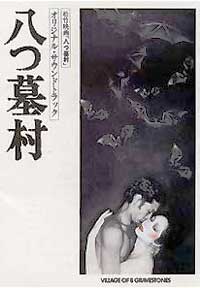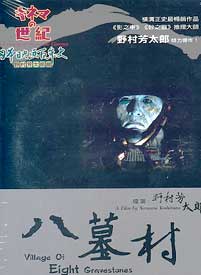 Yatsu haka-mura (The Village of Eight Gravestones aka Village of the Eight Tombs, Shochiku, 1977) is based on a classic 1951 occult detective or horror novel by Seishi Yokomizo, one of Japans greatest mystery writers. Yatsu haka-mura (The Village of Eight Gravestones aka Village of the Eight Tombs, Shochiku, 1977) is based on a classic 1951 occult detective or horror novel by Seishi Yokomizo, one of Japans greatest mystery writers.
The 1977 film version, in scope & color, was directed by Yoshitaro Nomura, who also directed Kichiku (Demon, Shochiku, 1978) & Suno no utsuwa (Castle & Sand,Shochiku, 1974).
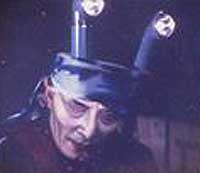 The story of The Village of Eight Gravestones was first filmed as a Chiezo Kataoka vehicle directed by Sadaji Matsuda in 1951, & in 1996 by Kon Ichikawa, & the novel is so well known that Japanese audiences wouldn't need every scene spelled out too much, so all of these versions, including the 1977 film, can be a little confusing to western viewers, though well worth the attentiveness required. The story of The Village of Eight Gravestones was first filmed as a Chiezo Kataoka vehicle directed by Sadaji Matsuda in 1951, & in 1996 by Kon Ichikawa, & the novel is so well known that Japanese audiences wouldn't need every scene spelled out too much, so all of these versions, including the 1977 film, can be a little confusing to western viewers, though well worth the attentiveness required.
The cast is headed up by Kenichi Hagiwara, Mayami Ogawa, Kiyoshi Atsumi, Isao Natsuyagi, Tsutomu Yamazaki, & Yasushi Akutagawa. A young man (Kenichi Hagiwara) discovers he is heir to a large estate in the village called Yatsuhakamura. But on the moment that he comes into contact with his heritage, villagers begin to die under agonizing situations.
The victims are descendants of villagers who conspired, four hundred years earlier, to drug & murder eight samurai who had tried to become farmers in the region.
The village's history has been marked by periodic mass murders, shown in vivid & horrifying flashbacks. Since the young heir's father was himself a mass murderer, villagers are certain that the man orphaned in childhood has to be responsible for the new series of murders. For a while, the viewer wonders, too, but detective Kindaichi Kensuke (Kiyoshi Atsumi, star of more than two dozen "Tora-san" comedies) looks more deeply into what may really be supernatural vengeance.
In the gruesome but arty flashbacks to the 15h Century, we witness the source of the curse of the eight gravestones.
SPOILERS ALERT The leader of those eight samurai, who was last to fall, refused to die until he could put a curse upon the village. He is truly a great screen monster as his strangely echoing voice promises doom to the conspirators & all their descendants.
When he is finally beheaded, his expression remains animated by gleeful certainty that his curse will come true.
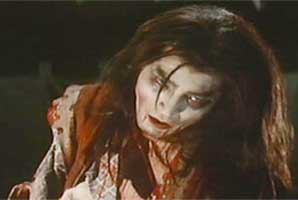 The film is for a while ambiguous about the possibility of a supernatural explanation to the murders. We're led to believe that a woman new to the village is using the people's superstitious nature in order to kill everyone who stands in the way of her taking over the land. The film is for a while ambiguous about the possibility of a supernatural explanation to the murders. We're led to believe that a woman new to the village is using the people's superstitious nature in order to kill everyone who stands in the way of her taking over the land.
The amiable detective Kindaichi undertakes an exhaustive search of records of events, trying to solve the mystery. He travels around Japan tracing the original eight samurai to their birthplaces, checking family geneologies, locating modern descendants.
The trail leads right back to the village of eight gravestones. He proves to his satisfaction that both the young male heir to the property, & the murderous widow new to the village, are descended from the leader of the samurai who cursed the village. Together they are a catalyst that spells doom for the descendants of those who committed a crime four centuries before.
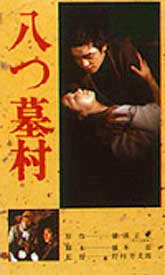 A long film, it takes an unweildly length of time to place all these complications where the viewer can see them. Twenty or even thirty minutes of this lengthy thriller could have been trimmed without injury to the story, & probably improve the pacing. A long film, it takes an unweildly length of time to place all these complications where the viewer can see them. Twenty or even thirty minutes of this lengthy thriller could have been trimmed without injury to the story, & probably improve the pacing.
However, slow as it moves, it's an exceedingly intriguing film both in style & content. Resoundingly eerie scenes deep underground are lingered upon until they almost lose their strangeness. The sets are so powerful it's understandable how the director found himself wanting the camera to linger on each bubbling pool or light-refracting gem-studded wall.
The pay-off for the long wait is spectacular. The murderess becomes possessed by the ghost of the 15th Century samurai, turning into a cat-eyed monster pursuing the heir through subterranean passages, until his own latent power triggers a deadly earthquake. The sound & visual effects are riveting. The music by Yashushi Akutagawa is appropriately melodramatic. END SPOILER ALERT
The epilog with the detective explaining everything is unfortunately necessary. Key bits of essential information were left out before the climax, making it something of a cheat as a detective story, & requiring loose ends to be neatly tied up with a dull, closing lecture. It's too bad the film couldn't've ended on the phenomenal climax without the postscript laying out how it all worked.
Still, even with the flaws which better planning & editing might have cured, The Village of Eight Gravestones is a truly worthwhile gory tale of the supernatural, one which deserves much wider circulation than it has thus far received.
As the film ends, we are given a final overwhelming image: the ghosts of the eight samurai standing on a hillside gazing down into the ravaged village, laughing. Pretty spooky!
copyright © by Paghat the Ratgirl
|
